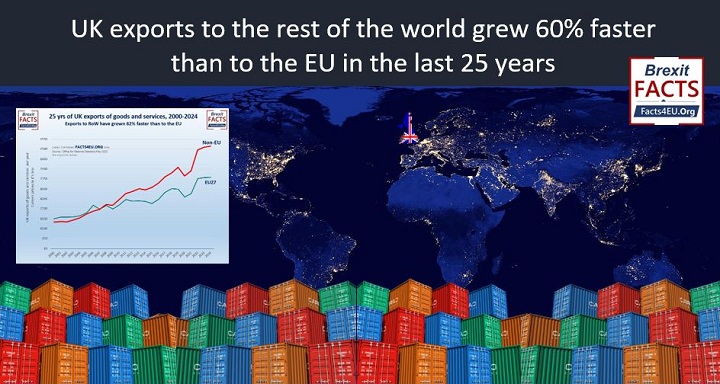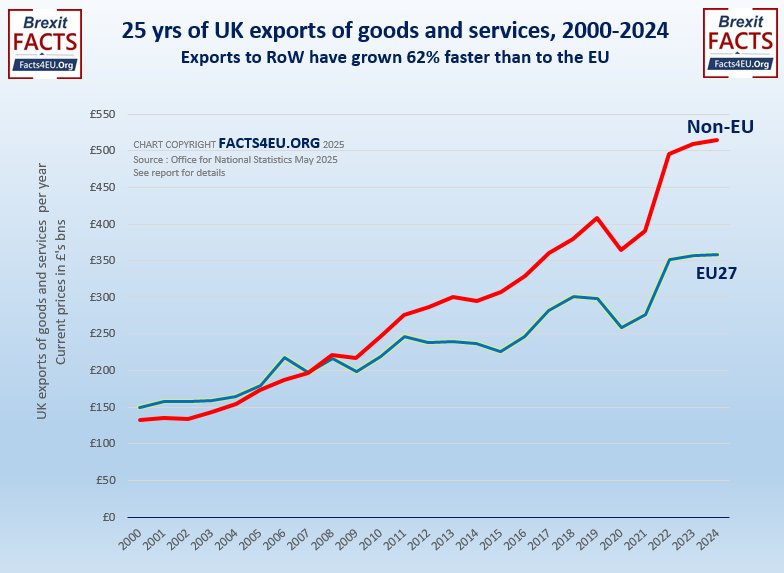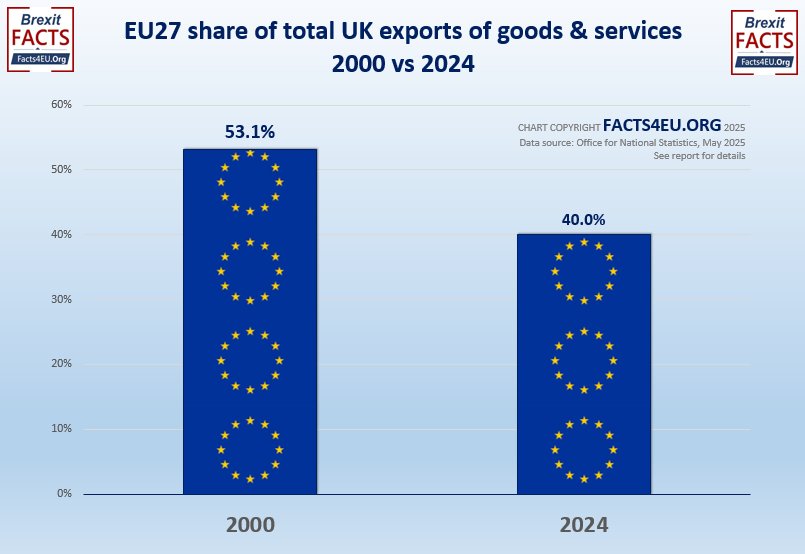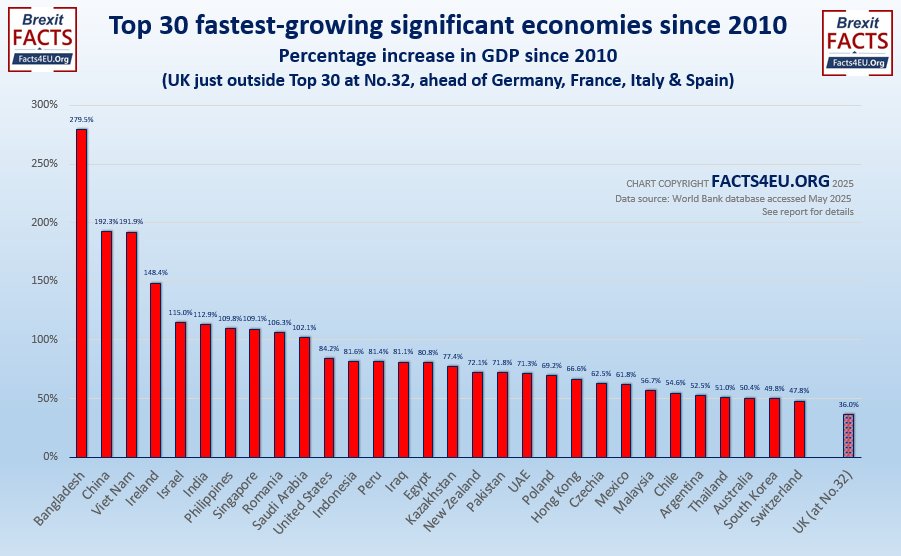British exports to non-EU countries have grown 60% faster than to EU in last 25 years
New report reveals steady decline and fall of the importance of the EU market for UK firms
Montage © Facts4EU.Org 2025
As EU’s share of UK total exports falls to 41.0%, report predicts EU will be only 1/3rd of UK market by 2040
On Thursday (15 May 2025) the latest trade figures were released by the Office for National Statistics. In-depth analysis by the Facts4EU think-tank in association with GB News shows that in the first quarter of this century (2000-2024) British exports to the rest of the world have grown 62% faster than to the EU.
Brexit Facts4EU.Org Summary
Growth of UK exports of goods and services over 25 years, 2000-2024
To the EU versus to the rest of the World
© Brexit Facts4EU.Org 2025 - click to enlarge
[Source: Office for National Statistics 15 May 2025.]
EU share of UK’s world exports has fallen consistently this century
In the year 2000 the EU market represented 53.1% of total UK exports to the world. 25 years later in 2024 this had fallen to just 41.0%. What’s even worse for the EU is that this proportion has been dropping steadily and inexorably for the whole of the first quarter of this century – well before Brexit was even talked about.
The drop from 53.1% down to 41.0% means that – looked at on its own - the EU’s share has fallen by well over a fifth in only 25 years. At the current rate of decline its share of total UK exports will be 33.3% - one-third - by 2040. Firstly here is the current position, in another of our famous ‘at-a-glance’ charts.
Brexit Facts4EU.Org Summary
EU’s share of total UK exports of goods and services,
first quarter of this century, 2000 vs 2024
© Brexit Facts4EU.Org 2025 - click to enlarge
[Source: Office for National Statistics, Thurs 15 May 2025.]
The Facts4EU forecast for the EU is even worse
Our prediction of only one-third of total British exports going to the EU by 2040 is based on the current trend over the past 25 years, as we stated. The true picture is likely to be far worse for the EU, however.
Facts4EU forecast for EU’s share of UK’s worldwide exports
Prepared exclusively for the GB News Membership and based on our extensive research
We forecast that the EU market will represent
c. 30% of the UK’s worldwide sales in just 10 years’ time: 2035.
It gets worse for the EU
The EU’s economy as a whole has been growing at very low levels this century, as more and more EU regulations and the higher costs associated with these have stifled innovation and investment.
Higher growth rates around the world have put the EU into the shade and British firms have been slowly taking advantage of the faster-expanding countries, with exports of UK goods and services increasing worldwide to the largest economies such as the US and China as well as to the small to mid-sized economies in parts of the world such as Asia.
The UK’s sales to the rest of the (non-EU) world have increased from well under half (46.9%) to 59.0% today.
Here’s why the EU’s problems are getting worse, faster
Economic growth is caused by a number of factors, not the least of which is increasing productivity. In open cultures welcoming of innovation and new technologies, these advances can cause significant uplifts in output per capita, raising living standards as well as overall economic performance as measured by GDP, for example.
The UK’s natural approach to innovation has traditionally been to embrace it. The majority of the most important inventions in the last three hundred years have been British, from the steam locomotive to the jet engine to the television to the World Wide Web itself. (Hat-tip to Sir Tim Berners-Lee.)
Conversely, the EU’s approach to innovation has been to legislate to control it. As any lawyer versed in both legal systems will tell you, in the EU you can only do something if the law says you can, whereas under the UK’s (and Anglosphere’s) Common Law system you can do more or less what you like unless there’s a law against it. This is a generalisation but it is essentially true. A good example of this is gene-edited crops, set to revolutionise agriculture worldwide. If the UK – a leader in the field - were back in the EU this would be stifled.
Going for growth – The effect of the UK’s strategy of trade deals and hitting fast-growing markets
Below we look at how the EU has been performing in terms of growth, compared to other parts of the world. We then discuss the effect of Brexit Britain’s freedom to do trade deals with much faster-growing parts countries and regions.
Brexit Facts4EU.Org Summary
The Brexit Facts4EU Top 30 growing economies since 2010
© Brexit Facts4EU.Org 2025 - click to enlarge
[Source: World Bank database, accessed 17 May 2025.]
Explanatory Notes: Facts4EU analysed economic growth rates around the world, looking at different time periods and different qualifying criteria in terms of size of country, etc. In the chart above we have used World Bank data from 2010 which goes up to 2023, so this is for 14 years. Nevertheless, this is a suitable period to judge countries who are now growing fast. We chose an arbitrary minimum GDP figure of $250bn for 2023, to weed out small economies. We then calculated the percentage increase in GDP since the year 2010 and this produces our list of the 30 fastest-growing economies over that time.
Finally, shouldn’t Sir Keir’s Summit be with the Trans-Pacific Partnership (CPTPP), rather than the EU?
In December the UK’s new trade deal with the massive CPTPP trading bloc entered fully into force. Yet we can’t recall Sir Keir even mentioning this. There are 11 countries in the CPTPP, with the UK now making the 12th, and more are lining up to join.
Of the 11, eight of these countries are in our list of the Top 30 fastest-growing significant economies in the chart above. The UK is at No.32, just outside our Top 30. Unfortunately the EU's largest economies of Germany, France and Italy are all below the UK, as is the EU37 average.
Would it not be a good idea to organise a London Summit for the fast-growing economies of the CPTPP, given that the UK became a fully-fledged member in December of last year?
Observations
Before Sir Keir Starmer starts his ‘Great EU Reset’ summit in London on Monday, he would do well to read this report. Sir Keir is neither a businessman not an economist. If he were to be characterised based on his training, experience and interests, it would probably be as an international human rights lawyer.
He still appears to be under the illusion that the EU is of vital interest to the UK’s future. In fact, as we have shown above, it is rapidly becoming a fading shadow of its former self. When Sir Keir talks of not choosing between the US and the EU, he would do well to remember that the US is by far the UK’s largest customer. He should also be reminded that UK firms do not sell to the EU, they sell to firms in EU countries. This means listing these countries seperately and when this is done it soon becomes clear how few are fast-growing for UK firms wishing to grow their exports.
The second key point he should take away from this report is our predction for the future. The combination of the UK now doing trade deals with faster-growing economies than the EU, and the more global outlook now being taken by British firms, means that the move away from the EU27 countries as important markets for the UK will accelerate.
The final point, of course, is that British companies will sell their goods and services wherever there is the best demand and that any cosying up and being ‘friendly’ with our EU neighbours on a political level is of little interest in boardrooms around the country. Companies across the EU will still buy British products, regardless of whether he sells out our fishermen to Brussels, as he seems intent on doing, or any of the other giveaways he is preparing to surrender.
These may appeal to the PM's internationalist, globalist, approach to life but they do nothing to help our country grow and prosper.
A little (imaginary) tale from the real world
For years Company A’s best customer has been Client X. Year-in, year-out, their purchases have made them Company A’s most important client. Nevertheless, their purchases have slowly been falling. The salesperson with that account is hauled into the Sales Director’s office and asked why this is.
“Well, I don’t think they’re doing very well, Sir,” he says. “Go back in and try harder,” replies the Sales Director, “maybe they’ve started buying from our competition.”
“Definitely not,” says the salesperson. “But I noticed Client X’s MD hasn’t upgraded his car for two years, whereas the MD of their competitor Client Y just got himself a new top-end Range Rover, so I popped in there and got us this.” He passes a sales order across the desk. “Wow,” says the Sales Director, “this is twice their usual monthly order.”
“Yes,” says the salesperson proudly, “and they’re doing so well I think this is just the start. By next year I think they’ll be our no.1 customer. Now, about that bonus, Sir….”
Please, please help us to carry on our vital work in defence of independence, sovereignty, democracy and freedom by donating today. Thank you.
[ Sources: Office for National Statistics | World Bank ] Politicians and journalists can contact us for details, as ever.
Brexit Facts4EU.Org, Sun/Mon 18/19 May 2025
Click here to go to our news headlines
Please scroll down to COMMENT on the above article.
And don't forget actually to post your message after you have previewed it!
Since before the EU Referendum, Brexit Facts4EU.Org
has been the most prolific researcher and publisher of Brexit facts in the world.
Supported by MPs, MEPs, & other groups, our work has impact.
We think facts matter. Please donate today, so that we can continue to ensure a clean Brexit is finally delivered.
Paypal Users Only - Choose amount first
Quick One-off
Monthly






Something to say about this? Scroll down for reader comments